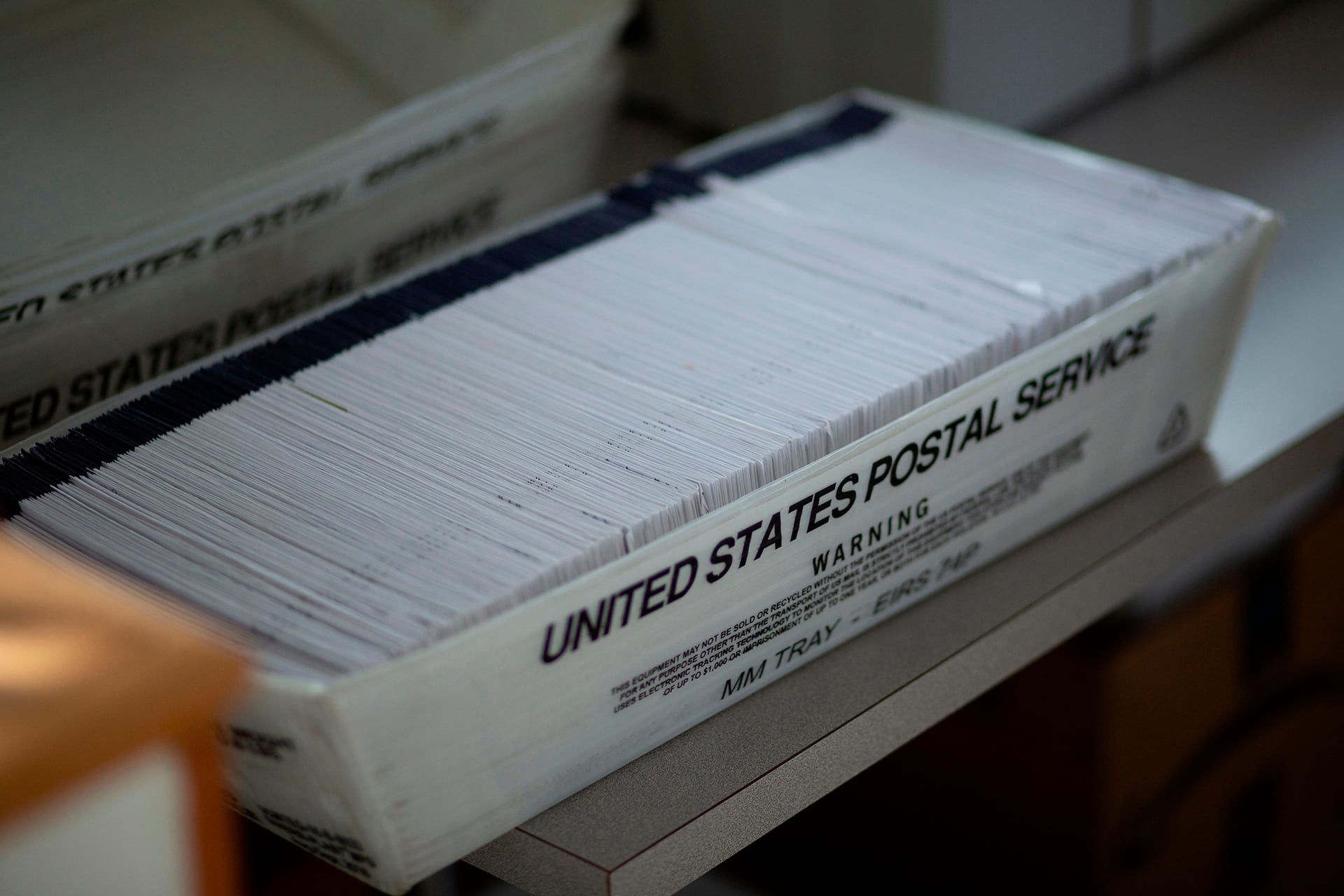Votebeat is a nonprofit news organization reporting on voting access and election administration across the U.S. Sign up for our free newsletters here.
A federal court has directed Pennsylvania counties to accept mail ballots that a voter has failed to date or misdated, a long-awaited decision that could affect thousands of ballots in the upcoming 2024 presidential election.
The date a voter writes on the envelope they return a mail ballot in is “immaterial” to its eligibility, Judge Susan Baxter of the United States District Court for the Western District of Pennsylvania ruled Tuesday. Under the materiality provision of the Civil Rights Act of 1964, Baxter said ballots should not be rejected over what is essentially a technicality that isn’t related to the voter’s eligibility.
“There are many reasons to date a document,” Baxter wrote, adding, “Dates may also be wholly irrelevant, as in this case. The requirement at issue here is irrelevant in determining when the voter signed their declaration.”
The ruling in the complicated and long-running case could still be appealed within 30 days. If it stands, it means counties would no longer be forced to disenfranchise voters for failing to date their mail ballot or using a date previous courts have found to be outside an acceptable time range.
Plaintiffs including the NAACP and League of Women Voters of Pennsylvania applauded the ruling.
“Pennsylvania citizens must have complete and unfettered access to the ballot box, free from unnecessary obstacles or interference,” said Susan Gobreski, vice president of policy at the League of Women Voters of Pennsylvania. “Today’s decision is a victory for voters and the accessibility of our elections.”
The Pennsylvania Department of State said in a statement that it is “pleased with the result.”
Roughly 8,000 ballots were rejected during the 2022 midterm election for lacking a proper date or signature on the return outer envelope, according to information from the Pennsylvania Department of State. The American Civil Liberties Union of Pennsylvania estimates that number was greater than 6,000 in this month’s municipal election.
A Votebeat and Spotlight PA analysis of data from three counties in 2022 — Philadelphia, Allegheny, and Erie — found voters submitting the flawed ballots were more likely to come from communities with higher than average non-white populations as compared to the voting population as a whole in the county.
“For 2023, the impact today is that counties should count the ballots they have set aside,” Marian Schneider, senior voting rights policy counsel at the ACLU of Pennsylvania, said.
Disputes over whether to count undated or incorrectly dated mail ballots in Pennsylvania have been before the courts since the state’s no-excuse mail voting law, Act 77, passed in 2019.
That law required that voters sign and date the outer return envelope.
A 2021 case out of Lehigh County challenged the provision, citing the 1964 Civil Rights Act’s requirement that a voter’s ballot could not be rejected for reasons that were immaterial to the voter’s eligibility.
In 2022, the U.S. Third Circuit Court of Appeals unanimously agreed with the immaterial defect argument in the Lehigh case, but the U.S. Supreme Court mooted the ruling later that year, after one of the candidates in the race in question had conceded.
That left the question again up in the air ahead of the 2022 midterm election, before the Pennsylvania Supreme Court ruled on Nov. 1 that counties should not count the ballots. The court defined an incorrectly dated ballot as one that fell outside of the range of Sept. 19 through Nov. 8, 2022, the date of the election.
In practice, this has often led to counties rejecting ballots that they know were cast in the correct time period.
Jeff Greenburg, a former election director in Mercer County who now works as a senior advisor on election administration for the Philadelphia-based nonprofit Committee of Seventy, said this issue has been one of the most pressing items counties have been looking to the Legislature to resolve.
When a mail ballot is sent from a county elections office or vendor hired by the county to a voter, the date it is sent is recorded in the Statewide Uniform Registry of Electors, or SURE system. As Baxter noted in the “undisputed facts” section of her opinion, counties also know exactly when the ballot is received back by election officials, since a barcode on the return envelope is scanned to record the return date.
Voters often forget to date the return envelope, write their birthdays, or, as a Votebeat and Spotlight PA reporter witnessed in Chester County earlier this month, they write just the month and year without a day.
“Simple voter error and partial omissions related to the date declaration also resulted in rejection of mail ballots that were timely received according to their entry into the SURE system,” Baxter wrote.
Shortly after last year’s election, the ACLU of Pennsylvania, along with the NAACP and several other organizations, sued the Pennsylvania Department of State in federal court to have these ballots counted.
It is not immediately clear if the losing parties, which include the Republican National Committee, Lancaster, and Berks counties, will appeal.
“You could imagine in a presidential cycle, when the number of ballots skyrockets, tens of thousands of ballots set aside due to errors like this,” Greenburg, of the Committee of Seventy, said. “My hope is that ultimately it is resolved in time for the 2024 election.”
Carter Walker is a reporter for Votebeat in partnership with Spotlight PA. Contact Carter at cwalker@votebeat.org.




